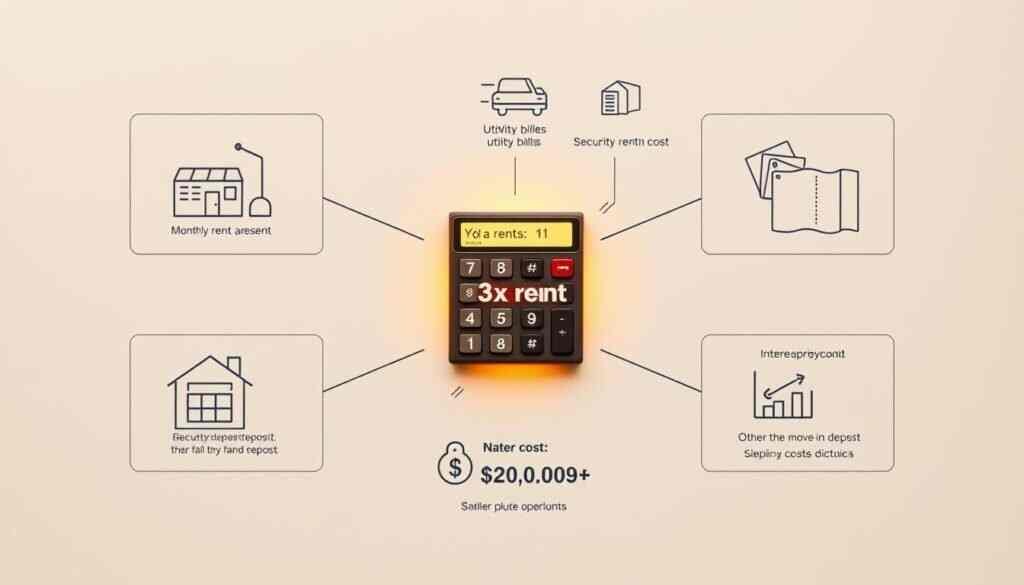Planning to move out raises the question of how much money you need. The cost depends on the type of move, distance, and movers needed. A moving cost calculator or the 3x rent rule can help figure out the amount. This rule suggests saving 3 times the rent for deposits and moving costs.
It’s important to plan for all moving expenses. This includes hiring movers, renting a truck, or using containers. The costs can add up quickly.

Understanding the costs involved in moving out is key to a successful move. The 3x rent rule is a good starting point. But, remember to also consider other costs like moving truck rentals, labor-only movers, and containers.
In South Riding, Virginia, hiring local movers can cost between $336 to $3,397. Long-distance movers can cost between $2,088 to $5,150. To get a better estimate, use a moving cost calculator or talk to a moving company. This will help you find the best option for your needs and budget.
Key Takeaways
- The cost of moving out depends on various factors, including type of move, distance, and number of movers required.
- The 3x rent rule suggests saving at least 3 times the rent for a security deposit, first month’s rent, and moving expenses.
- Using a moving cost calculator can help you estimate the costs involved in moving out.
- Hiring local movers can cost between $336 to $3,397, while long-distance movers can cost between $2,088 to $5,150.
- Considering the percentage of costs and using a calculator can help you plan ahead and make a successful move.
- The landlord 3x rent rule is a common requirement, so it’s essential to factor this into your moving costs.
- A moving cost calculator can help you determine how much money you need to move out and plan your budget.
Understanding the True Cost of Moving Out
When you think about moving out, it’s key to know the real costs. This includes upfront costs like security deposits and moving fees. It also includes ongoing costs like rent and utilities. To figure out 3 times the rent, you need to look at your income and expenses.
Landlords often ask for 3 times the rent. But, can they really ask for that? Yes, they can, but make sure to check your lease agreement.
One-time costs include application fees, credit check fees, and security deposits. Monthly costs include rent, utilities, and maybe private mortgage insurance (PMI). To avoid surprises, remember to include maintenance, repairs, and property taxes in your budget. For example, a $300,000 mortgage with a 7.2% interest rate means a monthly payment of about $2,100. It’s important to know how to calculate 3 times the rent to make sure you can afford it.

- Security deposits: usually equal to one month’s rent
- Moving costs: can range from $883 to $2,569 or more, depending on the distance and services required
- Application fees: usually around $20 to $100 per person
- Credit check fees: often included in the application fee or around $10 to $30 per person
By understanding these costs and considering if landlords can ask for 3 times the rent, you can prepare for the financial side of moving out. This helps you see if you can meet the 3x the rent requirement.
Breaking Down the 3x Rent Rule
The 3x rent rule means you should save at least 3 times your monthly rent. This covers moving costs, security deposits, and the first month’s rent. For instance, if you pay $1,500 a month, aim to save $4,500.
Can landlords ask for 3x the rent? Yes, it depends on where you live and the landlord’s rules. Some landlords want to make sure you can afford the rent. Always check your lease before signing.

Wondering if the 3x rent rule fits you? Think about your finances and the costs of renting. Here’s how to figure it out:
- Find out how much you pay each month for rent.
- Then, multiply that by 3 to find out how much you need to save.
- Remember to add in other costs like moving and security deposits.
By following these steps, you can save enough for the start of your rental. This helps avoid financial trouble.
Essential Financial Preparations Before Moving
Before you move out, it’s important to check your finances. This includes knowing if you meet the income three time limit rule. This rule helps landlords see if you can afford the rent. You might ask, do you really need to make three times the rent? And can landlords even ask for that?
It’s key to understand the landlords three times rent rule. This knowledge helps you avoid financial trouble.
Creating an emergency fund is also a must. It covers unexpected costs during your move. A good credit score can also help you get better loan rates and rentals. So, check your credit report and work on improving it before applying for anything.

Make sure you have all the right documents ready. This includes proof of income, employment, and ID. These documents are needed for the rental application. By preparing your finances, you’ll be ready for the challenges of renting a new place.
Some important things to remember include:
- Make a budget for all your expenses, like rent, utilities, and food.
- Save a part of your income for savings and emergencies.
- Keep an eye on your credit score and try to improve it.
- Have all the documents you need for the rental application.
By following these steps and understanding the income three time limit, you’ll be ready for the financial side of moving out. Stay organized, focus on your finances, and ask for help if you need it.
How Much Money Do You Need to Move Out: Calculating Your Budget
To figure out how much money you need to move out, think about different costs. These include security deposits, first month’s rent, and moving expenses. The amount you should save depends on where you’re moving, the size of your new place, and your financial situation. It’s wise to save enough for at least three to six months of living expenses.
When planning your budget, remember the costs of moving. For example, hiring a professional mover can cost about $1,713, as HomeAdvisor reports. You’ll also need to budget for rent, utilities, and other living expenses. The average rent in the US is around $1,968. Make sure you have enough saved to cover these costs to avoid financial stress.

To make a realistic budget, list all the moving expenses you’ll face. This includes:
- Security deposit
- First month’s rent
- Moving costs
- Utilities
- Furniture and appliances
By considering these costs and making a detailed budget, you can figure out how much to save. This will help you move smoothly into your new home. Always check and update your budget to stay on track with your financial goals. Think about how much you should save to move out to ensure stability.
Understanding Security Deposits and Upfront Costs
When you think about moving out, remember the upfront costs. These can quickly add up. Knowing what to expect helps you plan your budget better. Costs include security deposits, first and last month’s rent, and application fees.
To save for moving, you need to think about these costs. Security deposits can be a few hundred to a few thousand dollars. First and last month’s rent are also needed upfront, which can be a big expense. Don’t forget about application fees, pet deposits, and utility setup fees.
- Security deposit: $200-$2,000
- First and last month’s rent: $1,000-$5,000
- Application fees: $20-$100
- Additional charges: $100-$500
Understanding these costs helps you move smoothly. It also helps you avoid unexpected expenses. Make sure to include these costs in your moving budget to save for the move.
Monthly Income Requirements for Renting
To figure out how much money you need to relocate, think about the monthly income needed for renting. The rent-to-income ratio is key to knowing if you can afford it. Usually, housing costs should not be more than 30% of your income.
For instance, in Rochester, New York, the median home price is $129,000. This means you need an annual income of $51,960. The monthly mortgage payment is $650, which is about 15% of a monthly income of $4,330. This shows how to figure out the income needed for a rental property.
Here are some annual salaries needed to afford homes in different places:
- Harrisburg, Pennsylvania: $53,846
- Rochester, New York: $49,615
- Villas, Florida: $91,135
When planning to relocate, remember to include all costs. This includes rent, utilities, and other expenses. Knowing the monthly income needed for renting helps you plan better for your move.
Creating Your Moving Out Savings Plan
Having a solid savings plan is key when moving out. You’ll need to think about the 3x rent rule and its impact on your budget. It’s also important to know if the 3x rent rule is based on gross or net income. Plus, find out if landlords can demand 3 times the rent to rent.
To start, set realistic savings goals. Calculate your moving costs, like security deposits and first and last month’s rent. Make a budget that covers these costs and plan out when you’ll reach your savings goals.
- Emergency fund needs
- Credit score matters
- What documents you need to rent
By thinking about these points and making a detailed savings plan, you’ll be ready for the financial side of moving out. Make sure to save regularly and stick to a budget that fits your needs, keeping the 3x rent rule in mind.
Location-Based Cost Variations
When thinking about saving for a move, consider the cost of living in your new place. Moving costs can change a lot based on where you’re going. For example, in Washington D.C., the average monthly mortgage is $2,958. In West Virginia, it’s just $1,180. These numbers help you figure out how much you need to save.
Here are some key statistics to consider:
- Median monthly mortgage payment in Seattle: $3,603
- Median monthly mortgage payment in Detroit: $1,577
- Average APR for Conventional loans: 6.98%
- Average APR for FHA loans: 7.07%
It’s important to look into the cost of living in your new area. Use online tools to compare costs in different places. Also, think about other expenses like utilities and transportation when planning your savings.
Understanding the costs in your new location helps you plan better. Consider all expenses, including mortgage payments and living costs. This way, you can save the right amount before moving.
| City | Median Monthly Mortgage Payment |
|---|---|
| Seattle | $3,603 |
| Detroit | $1,577 |
| Washington D.C. | $2,958 |
| West Virginia | $1,180 |
Essential Items to Budget For
When you’re moving out, you need to think about all the costs. Moving can be expensive, but knowing what to expect helps you save. You’ll need to budget for furniture, utilities, and insurance.
Knowing these costs helps you make a good budget. This way, you can save money and move smoothly to your new place.
Furniture and Appliances
You’ll need to buy things like a bed, sofa, and kitchen stuff. The price depends on the quality and brand you pick.
Utilities and Services
Don’t forget to budget for things like electricity, water, and internet. You’ll also need to think about renter’s insurance and maintenance fees.
Insurance Costs
Insurance, like renter’s and health insurance, is important to include in your budget. Planning for these costs helps make your move easier and less stressful.
| Item | Estimated Cost |
|---|---|
| Furniture and Appliances | $1,000 – $3,000 |
| Utilities and Services | $100 – $300 per month |
| Insurance Costs | $50 – $100 per month |
Common Financial Mistakes to Avoid When Moving Out
When you move out, it’s key to avoid financial mistakes. One big error is not budgeting for all costs, like can landlords ask for three times the rent or can apartments ask for 3 times rent. This can cause a big financial problem if you’re not ready.
Another mistake is not looking into costs in different locations. For instance, can renters ask for 3x rent can change a lot depending on where you are. It’s important to include these costs in your budget.
Some common financial mistakes to avoid when moving out include: * Not budgeting for all expenses, including rent and utilities * Not researching location-based costs * Not having an emergency fund in place * Not considering the impact of can landlords ask for three times the rent or can apartments ask for 3 times rent on your finances
To avoid these mistakes, you can make your move smoother and keep your finances healthy. Always research and budget for all costs, including can renters ask for 3x rent. This will help you have a successful move.
Conclusion: Making Your Move Financially Successful
Starting your move out journey? Remember, financial planning is essential for a smooth transition. Create a detailed budget, research costs, and avoid common mistakes. This way, your move will be financially sound.
Begin by setting realistic savings goals and make a timeline to achieve them. Keep in mind the 3x rent rule for monthly income needs. Also, remember to include security deposits, application fees, and upfront costs in your budget.
With careful planning and budgeting, you can save up to move out. This will help you establish a strong financial base for your new one rental property. Stay alert, and your move will be a step towards a more independent and prosperous future.
FAQ
What is the 3x rent rule?
The 3x rent rule is a guideline. It says renters should save 3 times their monthly rent. This helps cover moving costs like security deposits and the first month’s rent.
Can landlords ask for 3 times the rent?
Yes, some landlords might ask for 3 times the rent as a security deposit. But, if it’s legal depends on local laws and rules.
How much should I save before moving out?
Save at least 3 times your monthly rent. This covers moving costs like security deposits and the first month’s rent. Also, building an emergency fund is key.
What are the typical one-time moving expenses?
One-time moving costs include security deposits and the first and last month’s rent. You’ll also need to pay for application fees, credit check fees, and moving services.
What are the monthly recurring costs associated with moving out?
Monthly costs include rent and utilities like electricity and internet. You’ll also need renters insurance and other monthly expenses for your new place.
Hidden costs include application fees and credit check fees. You’ll also need to pay for utility setup and furnish your new home.
How do I calculate the monthly income required to afford a rental property?
Your monthly rent should be no more than 30% of your income. To find out, divide your rent by 0.3.
How can I create a savings plan to move out?
Start by setting realistic savings goals and making a timeline. Create a budget that focuses on saving for moving expenses.
How does location affect the cost of moving out?
Moving costs vary by location. Rent, utilities, and other expenses differ in different areas.
What essential items do I need to budget for when moving out?
Budget for furniture and appliances, and utilities like electricity and internet. Don’t forget renters insurance.
What are some common financial mistakes to avoid when moving out?
Avoid not budgeting for all expenses and not researching local costs. Also, don’t underestimate the upfront costs of moving.